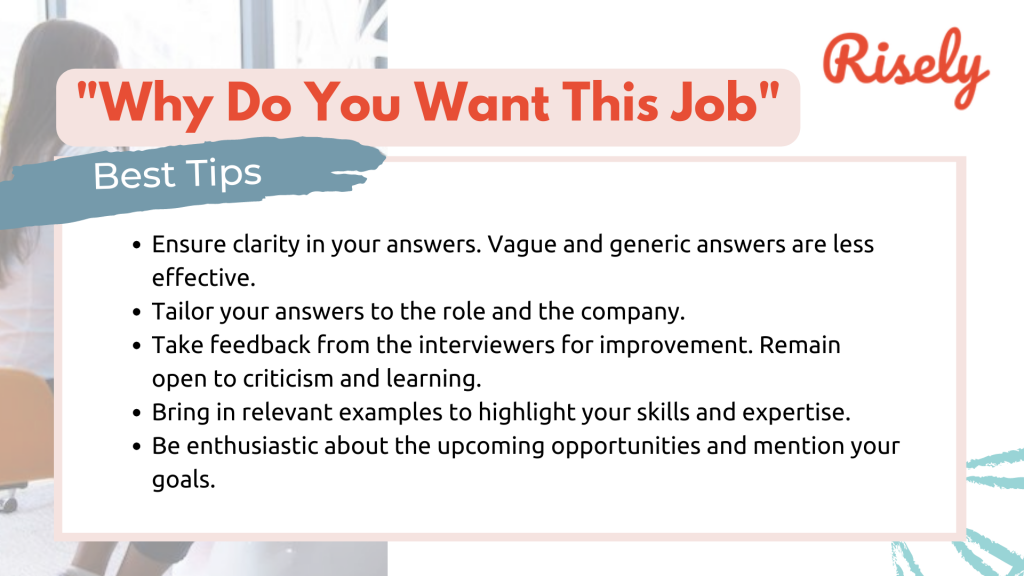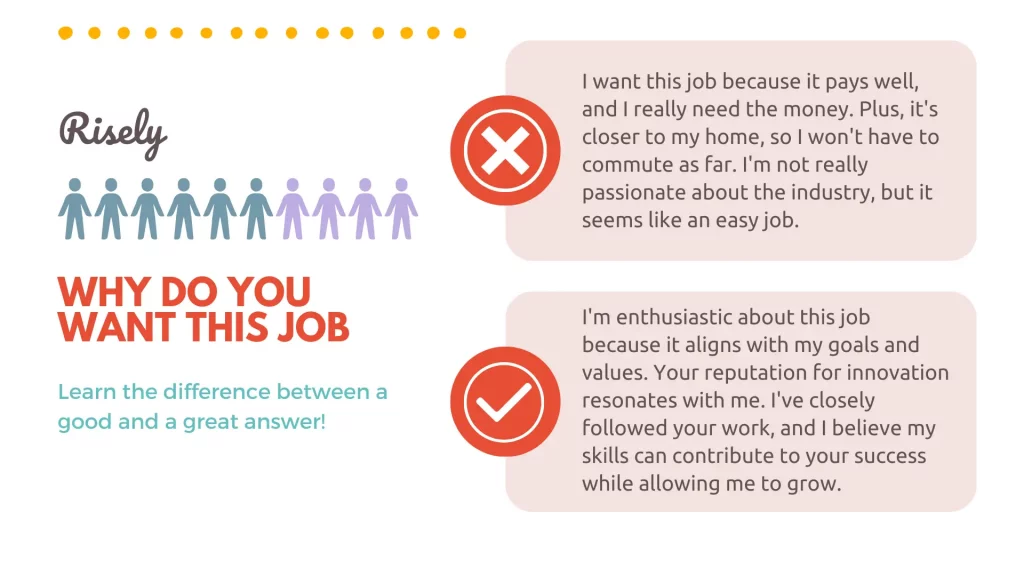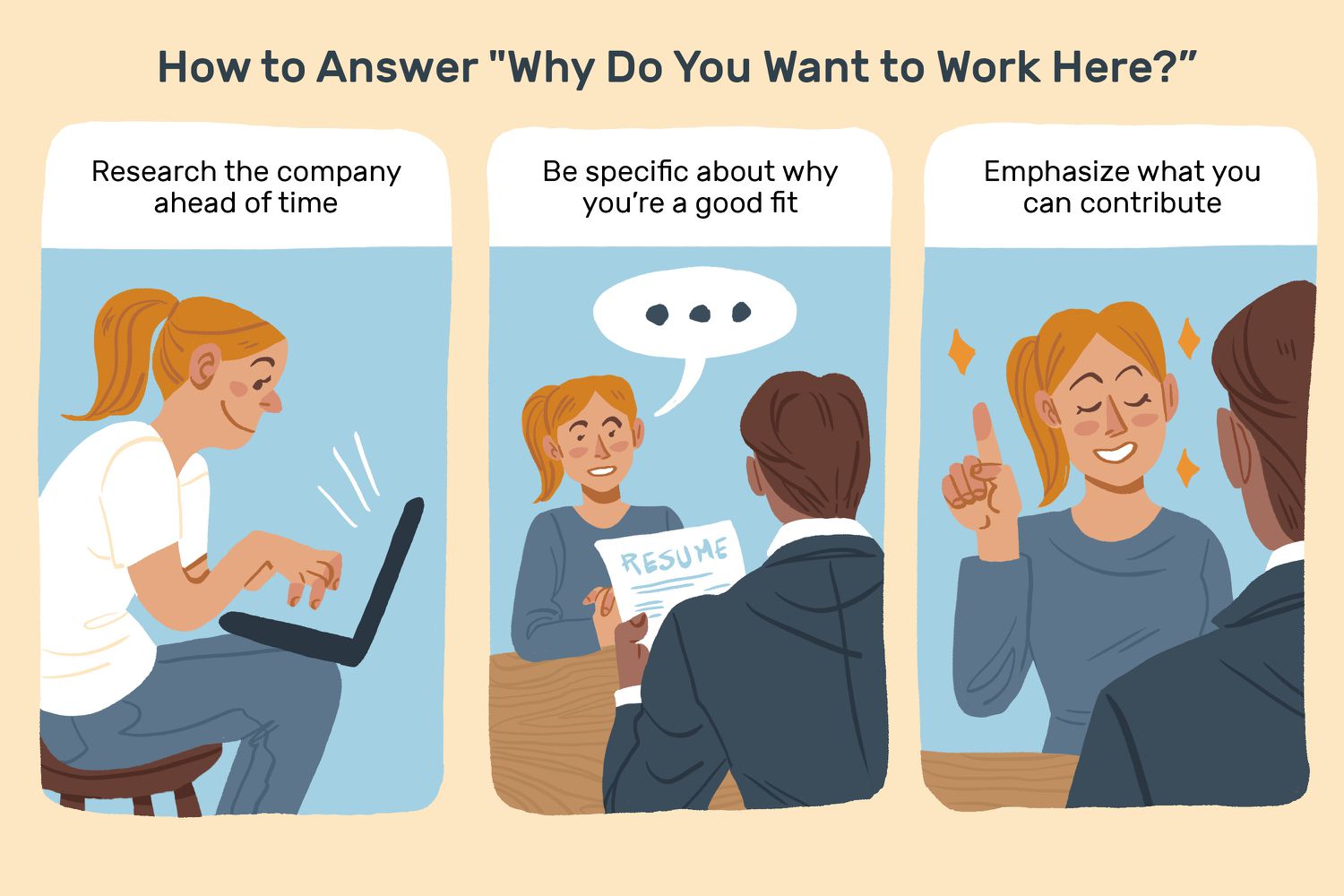I want this job because it aligns with my skills and career goals. I am passionate about contributing to your team’s success.
Securing this position excites me due to the company’s reputation for innovation and excellence. I admire your commitment to quality and customer satisfaction. This role offers a unique opportunity to apply my expertise in a dynamic environment. I thrive in collaborative settings and believe my proactive approach will add value.
Working here would allow me to grow professionally while helping the company achieve its objectives. I am eager to contribute my skills in a meaningful way and tackle the challenges that come with this role. Joining your team represents the ideal next step in my career journey.

Credit: www.tiktok.com
The Essence Of Job Motivation
Understanding job motivation is key to finding fulfillment in work. It involves knowing what drives you. This knowledge helps you align your values with your career. Clear motivation leads to job satisfaction. Let’s explore two critical aspects of job motivation.
Personal Growth Prospects
Job motivation often stems from the desire for personal growth. People want to learn and improve. Here are some reasons why personal growth is vital:
- Enhances skills and knowledge.
- Boosts confidence and self-esteem.
- Opens doors to new opportunities.
Consider these aspects of personal growth:
| Growth Aspect | Benefits |
|---|---|
| Skill Development | Improved job performance. |
| Networking | New connections and relationships. |
| Feedback | Constructive criticism for improvement. |
Seeking personal growth makes work more enjoyable. It creates a sense of purpose. This motivation drives you to excel.
Alignment With Career Goals
Another essential factor is alignment with career goals. Your job should support your long-term vision. This alignment helps maintain enthusiasm and focus. Consider these points:
- Identify your career objectives.
- Find roles that fit those objectives.
- Evaluate if the company’s mission aligns with your goals.
When your job aligns with your career goals, you feel fulfilled. Your work becomes meaningful. You are more likely to succeed and thrive.
Cultural Fit And Company Values
Cultural fit and company values matter in any job. They shape the work environment. They define how employees interact. Understanding these elements is key to finding joy at work.
Resonance With Company Ethos
Company ethos reflects its core beliefs. When your values align, you feel at home. Here are some reasons why this alignment is crucial:
- Shared Goals: Working towards common objectives boosts teamwork.
- Motivation: A shared vision inspires everyone to perform well.
- Job Satisfaction: Feeling connected to the company enhances happiness.
Ask yourself these questions to assess fit:
- What values does the company promote?
- Do these values match my personal beliefs?
- How does the company demonstrate its values?
Work Environment Dynamics
The work environment affects daily experiences. A supportive atmosphere fosters growth. Consider these aspects of a positive work environment:
| Aspect | Impact |
|---|---|
| Collaboration | Encourages teamwork and idea sharing. |
| Diversity | Brings fresh perspectives and creativity. |
| Support | Boosts morale and employee well-being. |
Identify what you need in a work environment:
- Do you prefer teamwork or independent work?
- Is a flexible schedule important for you?
- How do you handle feedback and criticism?
Passion For The Role
Passion drives us to excel in our careers. It fuels our desire to learn and grow. When you express your passion for a job, it shows commitment. Employers seek individuals who truly care about their work.
Intrinsic Interest In The Field
Having a deep interest in your field makes work enjoyable. Here are some reasons why this interest matters:
- Continuous Learning: Passionate people seek knowledge. They stay updated with trends.
- Problem Solving: Interest leads to innovative solutions. Enthusiasm helps overcome challenges.
- Networking: Passionate individuals connect with like-minded people. They build strong professional relationships.
When you love what you do, it shows in your results. Your enthusiasm can inspire others around you.
The Joy Of Skill Application
Applying skills in a role brings satisfaction. Here’s why this joy matters:
- Boosts Confidence: Successfully using skills builds self-esteem.
- Enhances Creativity: Passionate individuals think outside the box. They explore new ideas.
- Increases Productivity: Enjoying tasks leads to better performance. Passionate workers often exceed expectations.
Being excited about using your skills makes work fulfilling. This enjoyment reflects positively on your team and organization.
Impact And Contribution
Understanding the impact and contribution of a job is vital. This aspect shapes both your career and the world around you. People often seek jobs to create change. They desire to make a difference and add real value. Let’s explore this important topic.
Desire To Make A Difference
Many individuals want jobs that matter. They seek roles where they can:
- Help others and improve lives.
- Support meaningful causes.
- Drive social or environmental change.
Feeling connected to a purpose boosts job satisfaction. It motivates you to work harder. Making a difference can lead to personal growth too. Your efforts can inspire others. This can build a strong, positive workplace culture.
Potential For Adding Value
Jobs offer a chance to add value. Here are ways you can contribute:
- Bring new ideas and innovation.
- Improve processes for efficiency.
- Enhance team collaboration.
Adding value not only benefits the company. It also helps you grow professionally. Employers appreciate employees who strive to make an impact. Your contributions can lead to recognition and advancement.
Consider this table showing potential impacts:
| Impact Area | Description |
|---|---|
| Community | Improving local lives through service and support. |
| Environment | Implementing sustainable practices in the workplace. |
| Workplace Culture | Creating a supportive and inclusive environment. |
Career Advancement Opportunities
Career advancement opportunities attract many job seekers. They offer a path to growth. Employees want to know they can rise in their careers. This section explores two key areas: leadership roles and skill development.
Ladder To Leadership
Many companies provide clear pathways to leadership. Here are some benefits of climbing the corporate ladder:
- Increased responsibility
- Higher salary potential
- Influence on company decisions
- Opportunity to mentor others
Leadership roles often come with exciting challenges. You can shape company culture and drive innovation. Each step up builds your confidence and expertise.
Skill Development And Training
Continuous learning is essential in today’s job market. Companies prioritize employee training programs. Here are key advantages:
- Access to workshops and seminars
- Online courses to enhance skills
- Certification programs for career advancement
Skill development not only improves your resume. It prepares you for future challenges. Employees who invest in their skills often see better job satisfaction.
| Opportunity | Benefit |
|---|---|
| Leadership Roles | Increased Influence |
| Training Programs | Enhanced Skills |
Choosing a job with strong advancement opportunities leads to a fulfilling career. Seek positions that offer growth in leadership and skills.

Credit: www.risely.me
Work-life Balance
Work-life balance is essential for happiness. It helps you enjoy both work and personal life. A good balance reduces stress and increases productivity.
Flexible Scheduling Benefits
Flexible scheduling allows you to choose your hours. This option provides many advantages:
- More time for family and friends
- Ability to pursue hobbies
- Less time commuting during peak hours
Flexible hours can lead to increased job satisfaction. Employees feel valued when they have control over their schedules.
Prioritizing Personal Time
Personal time is crucial for mental health. It helps recharge your mind and body. Here are some ways to prioritize personal time:
- Set clear work hours.
- Schedule breaks during the day.
- Use vacation days wisely.
Making time for yourself improves focus at work. A well-rested employee performs better and contributes more.
Compensation And Benefits
Compensation and benefits play a vital role in job satisfaction. They influence your financial well-being and overall quality of life. Understanding these aspects helps you make informed decisions about your career.
Financial Stability
Financial stability is a key factor in job satisfaction. A good salary ensures you meet your basic needs. It also allows for savings and investments.
Here are some points to consider:
- Competitive salary packages.
- Opportunities for raises and bonuses.
- Clear salary structure and transparency.
Many companies offer performance-based incentives. This encourages employees to excel. It also aligns their goals with the company’s success.
Health And Retirement Perks
Health and retirement benefits are crucial for long-term security. These perks protect your well-being and future. A comprehensive benefits package can make a big difference.
Consider these benefits:
- Health insurance coverage.
- Dental and vision plans.
- Retirement savings plans (e.g., 401(k)).
Many companies match your contributions to retirement plans. This boosts your savings significantly. Health benefits reduce your medical expenses and stress.
| Benefit Type | Details |
|---|---|
| Health Insurance | Covers medical, dental, and vision care. |
| Retirement Plans | Includes employer match and investment options. |
| Paid Time Off | Includes vacation, sick leave, and holidays. |
Choosing a job with strong compensation and benefits leads to peace of mind. This allows you to focus on work and personal growth.
The Future Vision
The future vision for a job defines your path forward. It shapes your goals and ambitions. Understanding this vision helps you align with the company. It also shows your commitment to growth and success.
Long-term Career Trajectory
Consider your long-term career trajectory. Ask yourself these questions:
- What roles do I aspire to hold?
- How does this job fit into my career plan?
- What skills will I gain here?
Your answers will guide your professional journey. This role should be a stepping stone. Aim for positions that challenge you and allow growth.
A clear career path can boost motivation. It shows you are serious about your future. Employers value candidates with vision.
Adaptability And Industry Trends
Adaptability is crucial in any job. The industry changes rapidly. Stay informed about new trends and technologies. This knowledge keeps you relevant.
Focus on these aspects:
- Current industry challenges
- Emerging technologies
- Shifting consumer behaviors
Being adaptable means you can thrive. It also shows you can learn and grow. Employers seek flexible employees who embrace change.
Prepare for future changes in your field. Understanding trends helps you stay ahead. This proactive approach demonstrates your commitment.

Credit: www.risely.me
Frequently Asked Questions
Why Is This Question Important In Interviews?
This question helps employers understand your motivation. It reveals how well you align with the company’s values. Sharing your genuine interest can set you apart from other candidates. Highlighting your passion can showcase your potential for long-term commitment.
How Should I Prepare My Answer?
To prepare, research the company and its culture. Identify specific aspects that resonate with you. Reflect on your career goals and how they align with the position. Practice articulating your thoughts clearly to enhance your confidence during the interview.
What Should I Emphasize In My Response?
Emphasize your enthusiasm for the role and the company. Discuss how your skills can contribute to the team. Mention any personal experiences that connect you to the company’s mission. This approach demonstrates both passion and suitability for the position.
Can I Mention Salary Expectations?
While salary is important, focus on your passion first. Discussing compensation can come later in the conversation. Highlighting your interest in the job shows commitment. This strategy creates a more favorable impression with potential employers.
Conclusion
Understanding your motivation for wanting a job is crucial. It helps you articulate your passion and align with the company’s goals. Being clear about your reasons can set you apart from other candidates. Take the time to reflect on what drives you.
This insight will enhance your job application and interview success.
